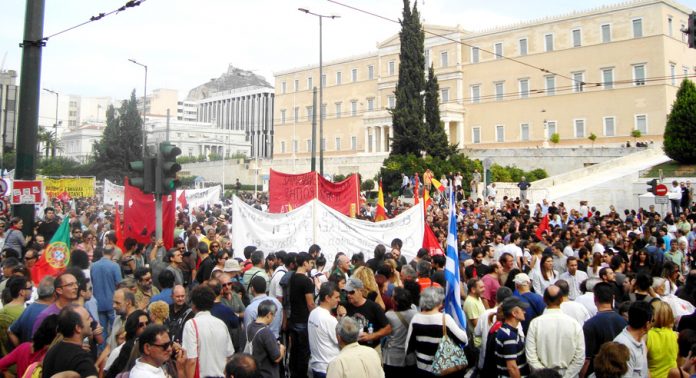OVER 60,000 workers and youth, in angry and militant mood, defied the riot police and demonstrated at a rally in front of the Vouli (Greek parliament) in Athens against the visit of German Chancellor Angela Merkel last Tuesday afternoon.
The rally was organised by the GSEE (Greek TUC) and ADEDY (public sector trades union federation) as part of a three-hours Athens-wide stoppage.
A joint meeting of the GSEE and ADEDY Executives had been scheduled for the next morning (Wednesday) to plan further action. The ADEDY, the Coalition of the Radical Left and the Greek Communist Party, are calling for a one-day general strike on 18 October.
However on Tuesday, large delegations of trades unions, such as the DEH (State Electricity Board) workers, health and local government workers, organised marches to converge on the large Syntagma Square outside the Vouli building.
The Greek Communist Party (KKE) also organised a 20,000-strong march through Athens city centre.
But it was clear at the rally that tens of thousands of workers had come to the rally on their own.
According to the Greek Ministry for Public Order over 7,000 police had been mobilised to protect Merkel. A large chunk of the city of Athens and the airport were declared prohibited areas by the Athens Chief of Police, under a 1971 edict of the then military junta which banned demonstrations or public meetings of more than five persons.
Merkel met the Greek Head of State, Karolos Papoulias, who told her that ‘the Greek people suffer and their patience has been extinguished.’
At the subsequent joint press conference with the Greek Prime Minister, Antonis Samaras, Merkel insisted that Greece ‘must complete this course (of austerity measures) so that things won’t get dramatic later.’
She promised help for Greece to secure European funds but said that the next payment of the EC-IMF-ECB bailout fund to Greece won’t materialise until the end of November.
That was a blow to Samaras who was expecting much more than a few kind words.
Merkel mentioned local government and health as two areas of collaboration by the two countries that can be achieved through the European Commission’s Task Force imposed on Greece which dictates economic policies.
Merkel named the German Deputy Labour Minister Hans Joachim Fuchtel and Task Force’s head Horst Reichenbach as the two people the Greek government must collaborate with.
Local government and health are being literally smashed by the coalition government headed by Samaras.
Merkel performed in Athens arrogantly as the master of the euro, and the Greek Prime Minister was clearly humiliated by her.
But Merkel’s visit to Athens intensified the class struggle in Greece. It was meant to be a show of strength, and solidarity with the collapsing Greek government; but it was exposed as a public relations exercise that only further weakened the Samaras coalition.
While Merkel gave orders and promises, tens of thousands demonstrated not just in Athens but in every Greek city. And in the cities of Salonica and Volos demonstrators besieged the German consulates.
In Athens Greek riot police attacked stone throwing youths in Syntagma Square with noise and smoke grenades and tear gas, and then unleashed a truncheon attack clearing the Square.
Once again, the riot police attack was launched after the trades unions delegations and the Communist Party contingents had left the Square.
Police said that 220 demonstrators were arrested and 24 were charged. Police admitted that dozens were arrested in the morning prior to the rally. The Construction Workers trade union said that two of the union’s Executive were arrested by the riot police after they left a building site on their way to the rally.
Earlier, riot police had attacked hospital workers who were demonstrating against the closure of the Henry Dunant Hospital enforcing the Police Chief’s declaration. Workers attempted to block the main road through which the motorcade carrying Merkel from the airport to the Greek President’s Office was to travel.
Representatives of the associations of doctors, lawyers, pharmacists, notaries and justice court attendants met and decided to launch a joint national strike on 17 October along with a demonstration to the Finance Ministry.
Meanwhile, fifteen Greek anti-fascist protesters who were arrested in Athens after a clash with members of the Greek neo-Nazi party Golden Dawn were severely tortured by police while in custody, according to the group’s lawyers.
Fifteen of those arrested in Athens during the September 30 demonstration say they were subjected to ‘Abu Ghraib-style’ humiliation. An additional 25 others who took part in solidarity protests following the original arrests were also detained and tortured.
Those detained allege they were beaten by police before and during their 19 hours-long stay in detention.
They were also forced to strip naked and were put in humiliating positions.
On many occasions multiple police officers would watch and take turns beating the prisoners. They were spat on, ‘used as ashtrays,’ verbally abused, and kept awake all night.
The protesters were denied drinking water and access to lawyers for the full 19 hours. ‘We were so thirsty we drank water from the toilets,’ one protester said.
Many said the torture was videoed by the officers on their mobile phones. The officers also threatened to post the pictures on the internet and to give the detainees’ home addresses to Golden Dawn party members, the violent neo-Nazi organisation which was the reason for the protests.
Charis Ladis, one of the protester’s lawyer, stated: ‘This case shows that a page has been turned. Until now there was an assumption that someone who was arrested, even violently, would be safe in custody.’
Dimitris Katsaris, a lawyer for four of the protesters, stated, ‘This is the new face of the police, with the collaboration of the justice system.’
The original protest and site of the arrests had been called when a Tanzanian community centre was vandalised by a group of 80-100 Golden Dawn supporters.
The detainees have now been released on bail of 3,000 euros each.
